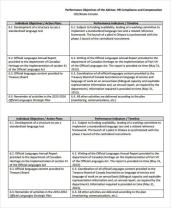Why good writing skills are important in the workplace?
Good writing skills are critically important in the workplace for several reasons:
Effective Communication: Clear and concise writing ensures that your ideas and messages are communicated accurately. Whether you're writing emails, reports, memos, or proposals, being able to convey information effectively is crucial for workplace communication.
Professionalism: Strong writing skills contribute to a professional image. Well-written documents and messages reflect positively on both you and your organization. They convey attention to detail and a commitment to quality.
Clarity and Understanding: Clear writing reduces the risk of misunderstandings and misinterpretations. When instructions, policies, or procedures are written with clarity, employees can better understand and follow them, leading to improved efficiency and compliance.
Problem Solving: Writing is often used to document and analyze problems and propose solutions. Effective problem-solving documents require the ability to clearly present the issue, outline potential solutions, and justify recommendations.
Decision Making: Well-structured reports and proposals provide decision-makers with the information they need to make informed choices. Strong writing skills are essential for presenting data, analyses, and recommendations in a format that facilitates decision-making.
Customer Relations: In customer-facing roles, good writing skills are essential for providing clear, helpful, and professional responses to inquiries, complaints, or requests. Effective written communication contributes to customer satisfaction.
Team Collaboration: Collaboration often involves written communication, whether through project reports, collaborative documents, or emails. Strong writing skills facilitate effective teamwork by ensuring that ideas are conveyed clearly and concisely.
Career Advancement: Individuals with strong writing skills are often better positioned for career advancement. They can take on roles that involve leadership, communication with stakeholders, and the development of strategic documents.
Legal and Compliance: In industries with legal and regulatory requirements, compliance documentation must be accurate, clear, and comprehensive. Good writing is critical for creating contracts, policies, and compliance reports.
Marketing and Sales: Marketing materials, sales proposals, and product descriptions rely on persuasive and compelling writing to engage customers and clients. Effective marketing and sales writing can directly impact revenue and business success.
Reputation Management: Public relations and corporate communication efforts depend on well-crafted messages that enhance the organization's reputation and address crises effectively. Poorly written communication can damage a company's image.
Global Business: In an increasingly globalized world, strong writing skills are crucial for communicating with international partners, clients, and customers. Clear and culturally sensitive writing helps bridge language and cultural barriers.
Time and Resource Efficiency: Well-organized and concise writing saves time for both the writer and the reader. Employees who can write efficiently contribute to productivity gains in the workplace.
Documentation and Record Keeping: Accurate and well-maintained documentation is vital in many fields, including healthcare, legal, and engineering. Good writing skills are essential for creating and maintaining records.
Innovation and Research: Researchers and innovators rely on effective writing to document findings, secure patents, and communicate discoveries to peers and the wider community.
In summary, strong writing skills are a valuable asset in the workplace, contributing to effective communication, professionalism, decision-making, and overall productivity. They are essential across various industries and roles and can have a direct impact on an individual's career advancement and an organization's success.
The Significance of Strong Writing Skills in the Workplace
Strong writing skills are essential for success in the workplace. Whether you are communicating with colleagues, clients, or customers, your writing ability is a reflection of your professionalism and competence.
Well-written documents are clear, concise, and easy to understand. They are also free of errors in grammar and mechanics. When you take the time to craft your writing carefully, you show that you are respectful of your audience and that you care about the quality of your work.
Writing Abilities as a Key to Success in Professional Environments
Strong writing skills are particularly important in professional environments because they are necessary for a variety of tasks, including:
- Communication: Writing is one of the most common forms of communication in the workplace. Employees write emails, memos, reports, and other documents to communicate with their colleagues, managers, clients, and customers.
- Collaboration: Writing is also essential for collaboration. Employees often work on projects together, and they need to be able to communicate their ideas clearly and effectively in writing.
- Problem-solving: Writing can also be used to solve problems. For example, an employee may need to write a report to document the root cause of a problem and recommend solutions.
- Decision-making: Writing can also be used to make decisions. For example, an employee may need to write a proposal to convince their manager to approve a new project.
Why Effective Communication Through Writing Matters in Your Career
Effective communication through writing is essential for career success. Employees with strong writing skills are more likely to be promoted and to earn higher salaries. They are also more likely to be successful in their chosen field.
Here are some of the benefits of effective communication through writing:
- Builds credibility: When you write well, you demonstrate your knowledge, expertise, and professionalism. This can help you to build credibility with your colleagues, managers, and clients.
- Improves communication: Effective writing helps you to communicate your ideas clearly and concisely. This can lead to improved communication with your colleagues, managers, and clients.
- Increases productivity: When you write well, you can save time and improve your productivity. For example, if you are able to write clear and concise emails, you will spend less time answering questions from your recipients.
- Advances your career: Effective communication through writing can help you to advance your career. Employees with strong writing skills are more likely to be promoted and to earn higher salaries. They are also more likely to be successful in their chosen field.
Conclusion
Strong writing skills are essential for success in the workplace. By developing your writing skills, you can improve your communication, collaboration, problem-solving, and decision-making skills. You can also build credibility, improve your productivity, and advance your career.












